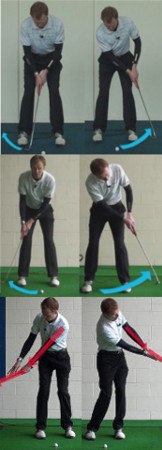
In this article on shoulder positioning at address, we want to touch on the important topic of the short game. While not necessarily as complicated as the full swing from a technical standpoint, the short game remains incredibly important to your overall success as a player. Without a good short game, you simply don’t stand a chance to reach your goals.
There are two main categories within the short game – putting, and chipping/pitching. When putting, it is a good idea to keep your shoulders in a perfectly square position at address, matching them as precisely as possible with your intended target line. Since you don’t have to worry about hitting fades or draws when putting, you should strive to keep everything as square as you can. Set your shoulders square to the target line and rock them back and forth to send the ball on its way.
With chipping, things get a bit more complicated. Here, you will probably want to setup with your shoulders slightly open to the line in order to swing from outside-in slightly. That might not be a great idea with a full swing, but it comes in handy here. If you swing across the ball just a bit when chipping, you will find that the ball pops up into the air with greater ease. Also, it is easier to get down to the ball when it is sitting in a poor lie. This is a great technique to use on many of your chip shots, but it does come with an exception. If you are trying to play a low bump and run shot which scurries across the green and rolls up to the hole, you’ll be better served to move your shoulders into a square (or even closed) position. In that case, you don’t want the added elevation open shoulders can provide, so square things back up for best results.
There are a lot of little details to consider when building a golf swing, and the relationship between your shoulders and the target line is one of those details. Armed with the information included in this article, we hope you are able to make progress with your swing (and your short game) in upcoming practice sessions. It’s never easy to get better at this game, but it is certainly rewarding when you start to see your efforts pay off in the form of lower scores.






